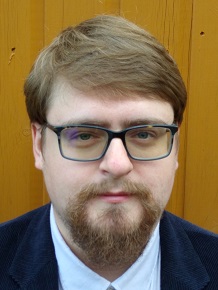Tom Lubek
Visit Tom Lubek's profile on the York Research Database to:
- See a full list of publications
- Browse activities and projects
- Explore connections, collaborators, related work and more
Profile
Biography
Tom was appointed as a Lecturer in Literature in 2022 and is a member of the interdisciplinary Centre for Modern Studies at York. Prior to that, Tom taught at York both as an Associate Lecturer and also as a Graduate Teaching Assistant during his PhD studies, which he completed in 2021. Tom’s PhD was funded by the White Rose College for the Arts & Humanities (WRoCAH). It was also supported by a 4-month research fellowship at the Huntington Library’s Octavia E. Butler Collection, which was funded via the AHRC’s International Placements Scheme. Tom also completed his BA degree in English (2014) and his MA degree in Film and Literature (2015) at York. He is an Associate Fellow of Advance HE.
Tom’s research considers debates about “world literature” and “world culture”, cultures of energy and resource extractivism (especially under neoliberalism), literary and filmic registrations of “petroculture”, and shifting understandings of the relationship between humanity and what is taken to be “nature” under capitalism. His current research focuses on contemporary world-SF literature and film and explores how SF can offer alternative models for conceptualising human-nature relations to those that underwrite the precarious petrocultural imaginaries of neoliberal capital today. His research asks how literature, film, and other cultural forms can offer glimpses of the relational and post-anthropocentric ways of thinking and being necessary to live equitably and sustainably on a damaged planet.
Alongside his teaching in the Department of English and Related Literature, Tom is working on his first monograph. He has also contributed an article to the “Powering the Future” special issue of the Open Library of Humanities Journal (2019), and, outside of SF studies, he has contributed a chapter to the undergraduate reference title Critical Insights: Hitchcock (Salem Press, 2017).
Research
Overview
Tom is currently working on his first monograph, Imagining Life on a Damaged Planet: Resourceful Futuring in World-SF Film and Literature. Areas of geographic and topic coverage carried over from his PhD work include speculative aftermaths of the plantation in North American and Caribbean Afrofuturism, the socio-ecological legacies of mining apocalypse in postapartheid South African SF, and the post-oil imaginaries of Nigerian SF. His monograph will also be supported by new research into additional primary text case studies to expand the project’s “world” coverage, including (but not limited to) contemporary utopianism in world-systemic core zones and speculative responses to the socio-ecological consequences of neoliberalisation in the former Eastern Bloc. The monograph will establish and map ‘world-SF’, which is Tom’s original formulation for a new subfield of world-ecologically conscious SF criticism that reorients the recent postcolonial turn of SF scholarship via emergent world-literary and energy humanities debates. The monograph will mobilise a comparative lens as it moves across multiple world-systemic locals to posit that world-SF texts are those that imagine the future in ways that register the uneven legacies of the past five centuries of capitalist modernity’s colonising projects. Tom’s monograph will explain how, from this vantage point, world-SF texts can offer alternative models to the fantasies of surplus and increasing energy expenditure that animate the “petrocultural” imaginaries of neoliberal capital today.
Alongside this monograph work, Tom is developing a journal article from material he gathered during his AHRC-funded IPS fellowship at the Huntington Library, which will explore how Octavia E. Butler’s abandoned drafts and early notes shed new light on how her published work posits a queer multispecies futurism as a valuable corrective to fantasies of extraterrestrial colonisation and neoliberal models of social reproduction.
Tom’s article “Cold War ‘Astrofuturism’ and ‘Energy-Angst’ in Destination Moon and Robert Heinlein’s Farmer in the Sky” (2019) analyses how these two 1950s US science fiction texts present petroculturally inflected visions of extraterrestrial futures beyond earthly ecological limits. His chapter in Critical Insights: Hitchcock (2017), “Space in Rear Window Revisited: Questions of Spectatorship, Community, and Surveillance”, discusses the Cold War spatial politics encoded by the cinematography of Hitchcock’s film. Tom has also presented conference papers based on his research into the ecopolitics of world-SF at Durham University, the University of York, Birmingham City University, the University of Helsinki, the University of Glasgow, and the University of Graz (online).
In the near future, Tom also hopes to develop two new research areas. The first of these will explore world-ecological consciousness in SF responses to climate change from and about the Arctic and Antarctic. The second will examine narratives that speculate upon the incorporation of lunar frontiers into the capitalist world-system.
Teaching
Undergraduate
Tom has taught broadly across literary forms, periods, traditions, and varied national contexts on several undergraduate modules in the Department: Approaches to Literature I: Writing Modernity (2017, 2020, 2022), Approaches to Literature II: Other Worlds (2022), A World of Literature II: Empire and Aftermaths (2021, 2023), and Key Concepts: An Introduction to Genre, Theory & Writing (2020-21, 2022-22, 2022-23). Specialising in First Year undergraduate teaching, he especially enjoys helping students make the transition to studying and writing about literature and culture at university level. Tom is committed to reflecting upon and refining his pedagogical practice and is an Associate Fellow of Advance HE (formerly the Higher Education Academy).
Postgraduate
Tom has previously acted as a stand-in marker for the MA module Reading for the World.
External activities
Overview
In 2018-19, Tom completed a 4-month AHRC-funded research fellowship at the Huntington Library in San Marino, California, where he worked with the collected papers of pioneering Black feminist SF author Octavia E. Butler. In 2019, he also completed a 1-month Researcher Employability Project with Coventry Cathedral and the Centre for the Study of Christianity and Culture as part of his WRoCAH-funded PhD programme, where he helped to design and update a new digital inventory for the Cathedral’s material collections.


